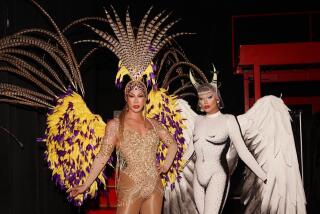Not All Italians Find Surgery Show Uplifting
- Share via
ROME — Italy is a country, let us not forget, where the prime minister recently took a month off, shelving economic crises and regional political demands, to have a face lift.
“I like the way I look,” Silvio Berlusconi told Italian fashion reporters when he reemerged after the surgery, tauter and tanner than usual. “I look in the mirror and I like what I see, and I think I am more pleasing to others too.”
So it would seem a natural fit that Italian TV viewers be treated to a weekly “reality” show on plastic surgery, with contestants who are given nose jobs, tummy tucks and breast lifts in full-frontal detail. But the show, “Scalpel: No One Is Perfect” -- an over-the-top version of America’s already over-the-top “Extreme Makeover” -- seems to be a bit too much for many here, even for an audience accustomed to rather risque TV fare, full of buxom blonds and silly game shows.
From the medical community to the Roman Catholic Church, groups have raised their voices in protest over what they call an exploitative misrepresentation of surgical complexities made to look simple. Participants are demeaned, and aesthetic alteration is portrayed as a panacea, the critics charge.
Nonsense, say the show’s makers, who argue that they are helping people who could not otherwise afford cosmetic surgery.
“Scalpel” premiered last month on a network owned, appropriately enough, by Berlusconi, part of the vast media empire that has made the prime minister one of the richest men on the planet. The show goes more or less like this: Platinette, Italy’s most famous drag queen, is one of the two hosts. Outfitted in a platinum bouffant wig and a tomato-red caftan over his very ample frame, he saunters onstage and extols the virtues of beauty, both external and internal.
His improbable co-host is Irene Pivetti, former speaker of the lower house of Parliament and a onetime conservative paragon of traditional Catholic values. Pivetti left politics a few years ago and became a regular on TV talk shows.
Pivetti appears with spiky, close-cropped hair, huge spangly earrings and tight-fitting black spandex. Each hourlong program features seven or eight cases, culled from “thousands” who responded to ads last summer calling for anyone interested in free physical improvement.
Last week, the cases included Linda, who wanted to skim and sculpt her bountiful nose in time for her wedding; Ktemania, who in detailed view, and with her tearful dad looking on, had her breasts lifted, snipped and reduced; and a young dancer whose oversized ear was trimmed and tweaked.
With great fanfare and flourish, flashing lights and a sexy theme song that pants, “I like it! I like it!” the remodeled contestant is then presented to his or her loved one before a live studio audience that oohs and ahs on cue.
“I love people,” Pivetti said in an interview. “I study their stories. I feel like they are very interesting, they’ve shown courage and are taking risks.”
But a leading association of plastic surgeons said it was horrified that serious medical procedures such as liposuction were being made to look like something you can do at the beauty parlor, right along with a pedicure. The show promotes unnecessary operations and creates unrealistic hopes, the 800-member Italian Society of Plastic, Reconstructive and Aesthetic Surgery said in a statement.
“Patients, especially young people ... acquire a false image of plastic surgery and come into our offices asking for absurd things,” Dr. Alessandro Massei, head of the association, said in an interview. “And many times the problem is only psychological. This is harmful, really harmful. These are patients asking for operations they would never ask for.”
Massei said member medics have been asked not to participate in “Scalpel,” and he has sought the intervention of media watchdog groups and contacted advertisers.
A leading Catholic magazine, Famiglia Cristiana, also took a swipe at the show, calling it a “triumph of bad taste.”
Maurizio Turrioni, the magazine’s entertainment editor, complained that the graphic images of the show appealed to the lowest common denominator of the viewing public while “exalting superficial values” and taking advantage of unsophisticated people who are insecure about their looks.
“Every tear, every drop of blood, every smile is merchandising,” Turrioni said in an interview. “It’s like a circus.”
Turrioni attributes the success of “Scalpel” in part to the need of many Italians, like Americans, to identify with and be validated by what they see on TV. In Italy, that is compounded by the national obsession with beauty and appearance.
“We have a prime minister who has created his career and identity through TV, who then considers having a face lift to be a matter of utmost importance, and then smiles while he tells us about it,” Turrioni said. “What should we learn from that?”
More to Read
The complete guide to home viewing
Get Screen Gab for everything about the TV shows and streaming movies everyone’s talking about.
You may occasionally receive promotional content from the Los Angeles Times.







